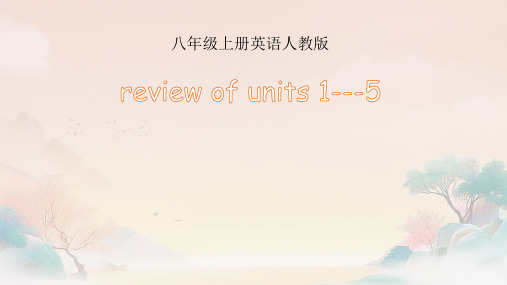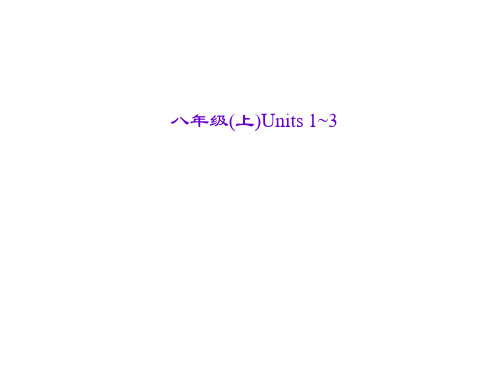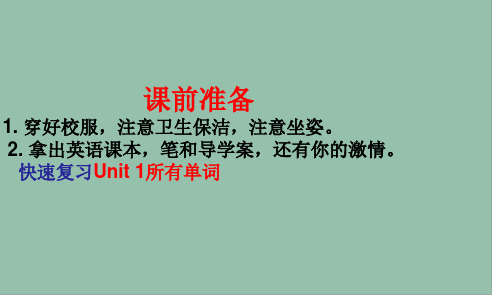人教版八年级英语上册复习课件全套
合集下载
期末总复习课件(共47张PPT) 人教版英语八年级上册.ppt

例如:He likes apples.他喜欢苹果。 ( 主语是He, likes 是动词第三人称单数形式)
一般现在时的关键词:always,(总是),often(经常), usually (通常), never从未;every day每天, every week每周, every year每年, sometimes有时候, at times时常。
A.as better as B.as good as √C.as well as
( )8.The programs on Channel 10 are ____better than Channel 5.
A.more
√B.much
C.many
( )9.He is _____than any other students in his class.
A.cold B√.colder
C.coldest
( )14.Which city is______,Bei jing,Shang hai or Liuzhou?A.bigB.bigger
√C.the biggest
模块5和6:动词不定式 (1)、(2)和双宾语。 1.动词不定式(带to的动词):to+动词原形(注:to do代表不定式) 例如:She wants to see her aunt.她想去看望她的阿姨。
( )4.I______ my homework when my mother came home.
A.am doing √B.was doing C.did ( )5.She often ______ shopping with her mother.
A√.goes B.go C.went ( )6.We_____swimming tomorrow afternoon.
一般现在时的关键词:always,(总是),often(经常), usually (通常), never从未;every day每天, every week每周, every year每年, sometimes有时候, at times时常。
A.as better as B.as good as √C.as well as
( )8.The programs on Channel 10 are ____better than Channel 5.
A.more
√B.much
C.many
( )9.He is _____than any other students in his class.
A.cold B√.colder
C.coldest
( )14.Which city is______,Bei jing,Shang hai or Liuzhou?A.bigB.bigger
√C.the biggest
模块5和6:动词不定式 (1)、(2)和双宾语。 1.动词不定式(带to的动词):to+动词原形(注:to do代表不定式) 例如:She wants to see her aunt.她想去看望她的阿姨。
( )4.I______ my homework when my mother came home.
A.am doing √B.was doing C.did ( )5.She often ______ shopping with her mother.
A√.goes B.go C.went ( )6.We_____swimming tomorrow afternoon.
人教版八年级上册英语复习课件

• want to do sth. 意思是“想要做某事”; • want sb. to do sth.意思是“想要某人做某事”。
如: • Do you want to go to the movies with me? • 你想和我一起去看电影吗?
• The teacher doesn't want us to eat hamburgers. • 老师不想让我们吃汉堡包。
• 29.尽量做某事 • try to do sth
• 20. activity survey • 活动调查 • 21.做家庭作业 • do homework • 22.做家务事 • do house work • 23.吃更少的肉 • eat less meat • 24.垃圾食物 • junk food • 25.对什么有益 • be good for • 26.对什么有害 • be bad for • 27. 想做某事 • want to do sth • 28.想某人做某事 • want sb to do sth
• What does she usually do on weekends? She sometimes go hiking.
• 3. “What’s your favorite program?” “It’s Animal World.”
•
“你最喜欢什么节目?”“动物世界。”
• 4. As for homework , most students do homework every day .
• 6. She says it’s good for my health. • be good for...表示“对……有益(有好处)”;其
反义为:be bad for...。(这里for 是介词,后 跟名词、代词或动词ing) • 如:It's good for us to do more reading. 多读书 对我们有好处。
如: • Do you want to go to the movies with me? • 你想和我一起去看电影吗?
• The teacher doesn't want us to eat hamburgers. • 老师不想让我们吃汉堡包。
• 29.尽量做某事 • try to do sth
• 20. activity survey • 活动调查 • 21.做家庭作业 • do homework • 22.做家务事 • do house work • 23.吃更少的肉 • eat less meat • 24.垃圾食物 • junk food • 25.对什么有益 • be good for • 26.对什么有害 • be bad for • 27. 想做某事 • want to do sth • 28.想某人做某事 • want sb to do sth
• What does she usually do on weekends? She sometimes go hiking.
• 3. “What’s your favorite program?” “It’s Animal World.”
•
“你最喜欢什么节目?”“动物世界。”
• 4. As for homework , most students do homework every day .
• 6. She says it’s good for my health. • be good for...表示“对……有益(有好处)”;其
反义为:be bad for...。(这里for 是介词,后 跟名词、代词或动词ing) • 如:It's good for us to do more reading. 多读书 对我们有好处。
Units 1---5 复习( 课件)-2024-2025学年人教版英语八年级

八年级上册英语人教版
Review the words of unit 1
任务一:我指你说
anyone
everyone someone bird
umbrella
anywhere of course diary
bicycle wet
wonderful myself enjoyable building because of
戏院;剧场 (n.) 使人舒服的;舒适的 (adj.) 座位;坐处(如椅子等) (n.) 银幕;屏幕 (n.) (在空间、时间上)接近 (adj.) 票;入场券 (n.)
worst 最差(的);最坏(的);最糟(的) (adj.& adv.) cheaply 便宜地;低廉地 (adv.)
song 歌;歌曲 (n.) choose 选择;挑选 (v.) carefully 细致地;小心地;谨慎地 (adv.) reporter 记者 (n.)
few
yourself activity trader
below
quite a few hen
decide
wonder enough
most
pig
try
difference hungry
something seem
paragliding top
as
noting
bored feel like wait
hill
review the grammar 一、一般过去时
一.概念:表示过去发生的动作,常与过去状语连用。 for example:yesterday, the day before yesterday,last week,three days ago,just now
Review the words of unit 1
任务一:我指你说
anyone
everyone someone bird
umbrella
anywhere of course diary
bicycle wet
wonderful myself enjoyable building because of
戏院;剧场 (n.) 使人舒服的;舒适的 (adj.) 座位;坐处(如椅子等) (n.) 银幕;屏幕 (n.) (在空间、时间上)接近 (adj.) 票;入场券 (n.)
worst 最差(的);最坏(的);最糟(的) (adj.& adv.) cheaply 便宜地;低廉地 (adv.)
song 歌;歌曲 (n.) choose 选择;挑选 (v.) carefully 细致地;小心地;谨慎地 (adv.) reporter 记者 (n.)
few
yourself activity trader
below
quite a few hen
decide
wonder enough
most
pig
try
difference hungry
something seem
paragliding top
as
noting
bored feel like wait
hill
review the grammar 一、一般过去时
一.概念:表示过去发生的动作,常与过去状语连用。 for example:yesterday, the day before yesterday,last week,three days ago,just now
Units 3-4 复习课件(共25张PPT)人教版八年级英语上册

6.The_s_a_y_i_n_g__s_(格言) are very important to me. 7.his journey was _f_a_n__t_a_s_t_i(c 极好的)and exciting. 8.Mo Yan is the Noble_P__r_i_z_e_(奖) w__i_n__n_e_r____(获胜者) 9.He is _s_e__r_i_o_u_s_(严肃的) , he takes everything _s__e_r_i_o_u_s_l_y(认真地). 10.For us all ,Lei Feng is the _e_x_a_m___p_l_e(实例,范例) of learning.
(n.) 15.choose(v.选择) — c_h_o_ic_e_ (n.) —__c_h_o_se (过去式\过去分词) — cho_s_e_n__ 16.friendly _m__o_re_f_ri_e_n_d_ly_\f_ri_e_nd_l_ie_r(比较级) __m__o_st__fr_ie_n_d_ly_\_fr_ie_n_d_li_es_t_-(最
1.有天赋的 talented 2.魔术师 magician
3.大声地 loudly 4.安静地 quietly
5.清晰地 clearly
6.真正 truly
7.有必要的 necessary
8.舒适的 9便宜地 10.小心地 11赢 12.谚语
uncomfortable cheaply carefully
1.quiet(adj.安静的)— _q_u_i_et_ly__(adv.) 2.clear (adj. 清楚的)-__c_l_e_a_r_ly__(adv.) 3.true(adj.真的)— _t_ru_l_y_ ( adv. )4.cheap(adj.便宜的)— _c_h_e_a_p(ly adv. ) 5.careful(adj.小心的)—_c_a_re_f_u_lly ( adv. )6.beautiful(adj.漂亮的)—b_e_a_u_ti_fu(llyadv.) 7.serious(adj.严Байду номын сангаас的,认真的,严重的) — _s_e_r_io_u_s_l_y__ adv. ) 8. comfortable(adj.舒服的)— c_o_m__fo_r_ta_b_ly_( adv.)(adj. 反)— u_n_c_o_m_fortable 9.crowd(v.拥挤)_c_ro_w__d(edadj.)(adj.反) — _u_n_c_ro_wded pete(v.竞争)—_c_o_m_p_e_t_it_o(r n.竞争者)—(n.竞争)_c_o_m_p_e_t_it_io_n___ 11.win(v.获胜 ) — _w_i_n_ne_r (n.获胜者) 12.talent(n.天赋) — __ta_l_e_n_te_d___ (adj.) 13.say(v.说)— _s_a_y_in(g n.谚语)14.create(v.创造) —c_re_a_ti_v(e adj.) — _c_r_ea_t_ivity
(n.) 15.choose(v.选择) — c_h_o_ic_e_ (n.) —__c_h_o_se (过去式\过去分词) — cho_s_e_n__ 16.friendly _m__o_re_f_ri_e_n_d_ly_\f_ri_e_nd_l_ie_r(比较级) __m__o_st__fr_ie_n_d_ly_\_fr_ie_n_d_li_es_t_-(最
1.有天赋的 talented 2.魔术师 magician
3.大声地 loudly 4.安静地 quietly
5.清晰地 clearly
6.真正 truly
7.有必要的 necessary
8.舒适的 9便宜地 10.小心地 11赢 12.谚语
uncomfortable cheaply carefully
1.quiet(adj.安静的)— _q_u_i_et_ly__(adv.) 2.clear (adj. 清楚的)-__c_l_e_a_r_ly__(adv.) 3.true(adj.真的)— _t_ru_l_y_ ( adv. )4.cheap(adj.便宜的)— _c_h_e_a_p(ly adv. ) 5.careful(adj.小心的)—_c_a_re_f_u_lly ( adv. )6.beautiful(adj.漂亮的)—b_e_a_u_ti_fu(llyadv.) 7.serious(adj.严Байду номын сангаас的,认真的,严重的) — _s_e_r_io_u_s_l_y__ adv. ) 8. comfortable(adj.舒服的)— c_o_m__fo_r_ta_b_ly_( adv.)(adj. 反)— u_n_c_o_m_fortable 9.crowd(v.拥挤)_c_ro_w__d(edadj.)(adj.反) — _u_n_c_ro_wded pete(v.竞争)—_c_o_m_p_e_t_it_o(r n.竞争者)—(n.竞争)_c_o_m_p_e_t_it_io_n___ 11.win(v.获胜 ) — _w_i_n_ne_r (n.获胜者) 12.talent(n.天赋) — __ta_l_e_n_te_d___ (adj.) 13.say(v.说)— _s_a_y_in(g n.谚语)14.create(v.创造) —c_re_a_ti_v(e adj.) — _c_r_ea_t_ivity
最新人教版八年级英语上册复习课件全册

death (n.)死;死亡 16.die(v.)→________ →_______ dead (adj.)死的 →________ dying (现在分词)
wrote (过去式) 17.write(v.)→________
→_________ written (过去分词)书写;写 →_______ writer (n.)作者;作家【高频】 well (adv.)好地 18.good(adj.)→ _______ →________ better (比较级)较好的(地);更好的(地)【高频】 best (最高级)最好的(地)【高频】 →______ loudly (adv.)喧闹地;大声地;响亮地 19.loud(adj.)→________ 20.quiet(adj.)→________ quietly (adv.)轻声地;轻柔地;安静地
hungry (adj.)饥饿的 9.hunger(n.)→_______ dislike (反义词)不喜爱(的事物);厌恶(的事物) 10.like(v.&n.)→________
11.one(num.)→______ once (adv.)一次;曾经 twice (adv.)两次;两倍 12.two(num.)→______ 13.swing(v.)→_______________ (过去式) swung/swang →______ swung (过去分词) swinging (现在分词)摇摆,摆动 →____________ 14.little(pron.)→____ less (比较级)较小的;更小的 least (最高级)最小的;最少的 →_____ healthy (adj.)健康的;强健的 15.health(n.)→________ healthily (adv.)健康地 →_____________
八年级上册英语全册复习课件【人教版】

第4页
中考复习与训练英语 ·配人教版
14.below (prep.&adv.)→_a_b_o_v_e____(反义词)在……上面;到……上面 15.hungry (adj.)→__h_u_n_g_e_r___(n.)饥饿 16.dislike (v.&n.)→___l_ik_e___(反义词)喜欢 17._h_o_u_s_e_w_o_r_k____(n.)家务劳动;家务事 18._a_l_m_o_s_t____(adv.)几乎,差不多 19.__n_e_v_e_r___(adv.)从不 20.once (adv.)一次,曾经→___tw__ic_e___(adv.)两次 21.full (adj.)→_e_m__p_ty____(反义词)空的 22.__p_ro_g_r_a_m____(n.)节目 23.___le_a_s_t___(adv.)最小;最少&(adj.&pron.)最小的;最少的
第7页
中考复习与训练英语 ·配人教版
44.__h_il_l____(n.)小山 45._d_u_c_k____(n.)鸭 46.I_n_t_e_rn_e_t______(n.)(国际)互联网 47._sw__in_g_____(n.)摆动;秋千&(v.)(使)摆动 48._m_a_y_b_e____(adv.)大概;或许 49.__re_s_u_l_t ____(n.)结果;后果 50.__p_er_c_e_n_t____(n.)百分之…… 51._t_e_le_v_i_si_o_n______(n.)电视机 52._t_h_r_o_u_g_h____(prep.)以;凭借 53.die(v.)→___d_e_a_th___(n.)死;死亡→___d_e_a_d__(adj.)死的 54.__h_o_w__e_v_e_r__(adv.)然而;不过
中考复习与训练英语 ·配人教版
14.below (prep.&adv.)→_a_b_o_v_e____(反义词)在……上面;到……上面 15.hungry (adj.)→__h_u_n_g_e_r___(n.)饥饿 16.dislike (v.&n.)→___l_ik_e___(反义词)喜欢 17._h_o_u_s_e_w_o_r_k____(n.)家务劳动;家务事 18._a_l_m_o_s_t____(adv.)几乎,差不多 19.__n_e_v_e_r___(adv.)从不 20.once (adv.)一次,曾经→___tw__ic_e___(adv.)两次 21.full (adj.)→_e_m__p_ty____(反义词)空的 22.__p_ro_g_r_a_m____(n.)节目 23.___le_a_s_t___(adv.)最小;最少&(adj.&pron.)最小的;最少的
第7页
中考复习与训练英语 ·配人教版
44.__h_il_l____(n.)小山 45._d_u_c_k____(n.)鸭 46.I_n_t_e_rn_e_t______(n.)(国际)互联网 47._sw__in_g_____(n.)摆动;秋千&(v.)(使)摆动 48._m_a_y_b_e____(adv.)大概;或许 49.__re_s_u_l_t ____(n.)结果;后果 50.__p_er_c_e_n_t____(n.)百分之…… 51._t_e_le_v_i_si_o_n______(n.)电视机 52._t_h_r_o_u_g_h____(prep.)以;凭借 53.die(v.)→___d_e_a_th___(n.)死;死亡→___d_e_a_d__(adj.)死的 54.__h_o_w__e_v_e_r__(adv.)然而;不过
人教版八年级英语上册期末复习课件全册

said the tour guide.
A. few
B. little
C. many
D. much
6.[2015省卷51题]—How is your old friend Katie?
—Oh, she′s moved to another city, so I′ve D ever seen her since then.
考点小练
7.我们没有足够的时间来完成这项工作。 We don′t have enough time to finish this work. 8.Tom doesn′t do his homework C ,so he always makes many mistakes.
A. enough careful
1.I was on vacation last month. 上个月我在度假。
6.She says it′s good for my health to drink milk every day.
2.Did you doanything special ?你做一些特殊的事情了吗? 她说每天喝牛奶有助于我的健康。
某事考Leabharlann 小练5.这条裙子对于她来说太贵了,因此她决定不买它。
The skirt is too expensive for her, so she decided not to buy it.
6.商店里有那么多种类的包。我不能决定买哪一个。
There are so many kinds of bags in the shop. I can′t decide which to buy .
13.from the top of the hill 从山顶上 14.take some photos 拍一些照片 15.learn something important 学一 些重要的东西 16.Tian'anmen Square 天安门广场 17.the Palace Museum故宫博物馆 18.Beijing hutong 北京胡同
Unit1++复习课件 人教版八年级英语上册

常考句子
1.---Where did you go on vacation? ---I went to New York City. 2. ---Who did you go there with? ---I went there with my family. 3. ---Did you buy anything special? ---No, I bought nothing. 4. ---How was the food? --- Everything tasted really good. 5. ---Did you go anywhere interesting? ---Yes, I went to Guizhou with my family.
自主检测 早读
1.复习课本P1-p.8页单词 2. 复习课本142.页不规则动词表
要求:1.提问本单元重点单词并检测 2.再次记忆错误单词
Task2重点短语
要求: 1.背诵重点短语 2. 检测-- 再次背诵
1.anyone任何人 2.anywhere在任何地方 3. wonderful精彩的,绝妙的 4.few不多,很少 5.most最多,大多数 6.wonderful精彩的 7.few不多 很少 8. most最多,大多数 9.something某事
相当多
11.go shopping
购物
11. stay at home
待着家里
12. in the countryside
在乡下
13. along the way
沿途
14. another two hours=two more hours另外两小时
15. because of
因为
新人教版八年级英语上册期末总复习课件

单词复习
famous著名的 well-known著名的 nature自然地 agree同意 normal一般的 unless除非不 certainly无疑的 serve服务 look after 照顾 invitation邀请
again再一次 angry发怒的 understanding善解人意的 careless粗心的 often多久 as far关于,至于 natural自然地 turn down拒绝 reply回复 forward发送
until直到 how often多久 how long 多长时间 how soon多久才... lendar日历 daytime白天 in half分成两半 halfway在中途 else别的,其他的
单词复习
how munch多少钱 how far多远 be good for对....好 be good at擅长...... be bad for 对.......有坏处 be good with 与....相处的好 wrong怎么了? halfway在中途 else别的,其他的
今日复习的重点
本单元的所有单词、短语、语法、长难句、课文
grow成长 meeting遇见 pollute污染 prepare准备 prepare for准备 two两个 twice两次 one一个 once一次 health健康 healthy健康的
单词复习
upset沮丧的 different不同的 unhealthy不健康的 difference差异 foot脚 feet脚步 advice建议,劝告 another其他的 happen发生 expect 期待
单词复习
mistake错误 week一周 a lot of 大量 be good for 对什么好 stress压力 get back返回 careful小心的 careless粗心的 advice建议 solve步骤 during在........期间
Units+3~4+复习(+课件)-2024-2025学年人教版英语八年级上册

核心形容词:serious (2)严肃的,认真的
一个严肃的人
a serious person
--Are you kidding?
你开玩笑吧?
--No, I'm serious.
不,我是认真的。
However,if you don't take these shows too seriously, they are fun to watch.
The Yellow River is the second longest river in China.
1.将二者进行比较时,用 比较级 。 句型1:A+比较级+than+ B ( A 比B 更...)
汤姆比迈克更高。
重
Tom is taller than Mike.
点
2.将三者或三者以上进行比较时,用 最高级。
5.The+比较级…,the+比较级…
“越……,越……”
The more,the better.
The more you eat,the fatter you will be.
6. 注意:比较级前面可以用even(更加), much/far a lot(……得多),a littlie/bit (一点), 等词语表示不定程度或数量。
A2.Et.whveeearyk+k比Bn.ohw较esaCl级thhiien.ra..Citsh.lgueectk+tiine比rg _D较_.w__o级_rse表示“越……越……”
A .rich and rich
B.richerBand richer
C. the richer,the richer D .richest and richest
一个严肃的人
a serious person
--Are you kidding?
你开玩笑吧?
--No, I'm serious.
不,我是认真的。
However,if you don't take these shows too seriously, they are fun to watch.
The Yellow River is the second longest river in China.
1.将二者进行比较时,用 比较级 。 句型1:A+比较级+than+ B ( A 比B 更...)
汤姆比迈克更高。
重
Tom is taller than Mike.
点
2.将三者或三者以上进行比较时,用 最高级。
5.The+比较级…,the+比较级…
“越……,越……”
The more,the better.
The more you eat,the fatter you will be.
6. 注意:比较级前面可以用even(更加), much/far a lot(……得多),a littlie/bit (一点), 等词语表示不定程度或数量。
A2.Et.whveeearyk+k比Bn.ohw较esaCl级thhiien.ra..Citsh.lgueectk+tiine比rg _D较_.w__o级_rse表示“越……越……”
A .rich and rich
B.richerBand richer
C. the richer,the richer D .richest and richest
人教版英语八年级上册Units1-3单元复习ppt课件

名词的复数形式;a little表示肯定,修饰不可数名词;little表示否定,修
饰不可数名词。根据问句的noodles是可数名词的复数形式及句意,
可知答句应该用a few。故选A项。
7
12 34 5 6 7
2.And because of the bad weather,we couldn’t see anything below. 由于天气不好,我们不能看见下面的东西。 【考点】 because of “因为”,后面可接名词、代词或动词-ing形式( 短语)。 Because of the storm he didn ’t go there. 因为暴风雨他没有去那儿。
playing
basketball,you or your brother?
A.at
B.in
C.on
答案:A
解析:句意:你或你的兄弟,谁更擅长打篮球?be good at意为“擅长”,
故选A项。
28
【典例2】 (2018 ·湖南邵阳中考)—
do you watch TV?
—Twice a week.
A.How often
B.How long
C.How soon
答案:A
解析:根据答语可知问句是提问动作发生的频率。故选A项。 16
12 34 5 6 7
5.We both like sports,but he plays tennis better,so he always wins. 我们两个都喜欢运动,但是他网球打得更好, 因此他总是赢。 【考点1】both表示“两者都……”。 Tom and I both like eating apples very much. 我和汤姆都非常喜欢吃苹果。 【辨析】 both与all
Unit+1-Unit+5++单元语法课件+2023-2024学年人教版八年级英语上册

______D__id__e_v_e_r_y_o_n_e_h__a_v_e_a__g_o_od time? Oh, yes. __E__v_e_r_y_th_i_n_g(一切) was excellent.
(每个人都玩的开心吗?)
定义 构成 用法
1. 复合不定代词的定义
由some, any, no, every分别加上-one, -body, -thing构成的不定代词叫做复合不定代词。
concerts or going to movies?
当表示一方超过另一方的“程度”时,可以用much, a lot, a little, a
bit, even, far等来修饰形容词比较级。注意:比较级不能用very,
so, too等修饰。 ➢ He is much more handsome than his brother. ➢ This book is even more useful than that one.
(蒂娜比塔拉外向。)
Are you as __f_r_i_e_n_d_l_y_ (友好) as your sister? No, I'm not. I'm __f_r_ie_n__d_li_e_r_ (友好) .
_D__o_e_s_T_a__r_a_w__o_r_k__a_s_h__a_r_d_a__s_T_i_n_a__?____
➢ After the new year, the day is becoming warmer and warmer. ➢ English is becoming more and more important. ◆“The + 比较级, the + 比较级” 意为 “越……,越……”。
最新人教版八年级英语上册复习课件全册

4. full 【归纳】 “忙的”,同义词为busy。 “满的”,反义词为empty (空的)。 “吃饱了的”,其反义词为hungry。
【运用】选出下列句子中full的含义。 A. 忙的 B. 满的 C. 吃饱了的 ( A ) (1) Her life was so full that she found no time for hobbies. ( C ) (2) No more for me, thanks — I’m full. ( B ) (3) Do you want a full cup of tea or half a cup?
3. start 【归纳】 v. “开始;着手”。 常用结构为start to do/ doing sth.,“开始做某事”。 【运用】完成句子,每空词数不限。 格蕾丝每天早上6点开始跑步。 starts to run/ running at 6 Grace ____________________ o’clcok every morning.
16. _________ junk food 垃圾食品 17. ___________ keep a diary 记日记 18. _____________ keep doing sth. 继续做某事 less than 少于 19. _________ look at the map 看地图 20. ______________ 21. __________ more than 多于 22. ______________ most of the time 大部分时间 23. _________ of course 当然;自然 24. __________ quite a few 相当多;不少 stay at home 待在家 25. ____________
人教版八年级英语上册全部PPT课件

精选ppt
10
名词所有格
1)单数名词词尾加’s, 复数名词词尾没有s, 也要加 ’s
the girl’s pen Children’s Day
2)复数名词以s结尾的只加 ’
the students’ reading room
3)如果两个名词并列,并且分别有 ’s, 则表示“分别 有”; 只有一个名词有一个’s, 则表示“共有”;
6、课本句型:And because of the bad weather, we couldn’t see anything below.
because of because
后跟名词、代词、He lost his job 动名词、或相当 because of his 于名词的短语, age. 不能接句子。
精选ppt
7
1、指定对象;
1)含body和one的复合不定代词只用 来指人,在功能和意义上完全相同,可以 互换。
For example:Someone/ Somebody is crying in the next room.
2)含thing的复合不定代词只用来指 物。
For exampl: Are you going to buy
bored
厌倦的,烦闷的, 一般在句中修饰人,
感到无聊的
做表语
无趣的,令人厌烦 一般在句中修饰事或
boring 的,单调的
物,可作表语和定语
课本句型:I feel like I was a bird. It was so exciting.
exciting excited
令人兴奋的,可作定语和表语, The story is 使人激动的 做表语是主语通 interesting.
人教版英语八年级上册Units3-4期末复习课件(共18张PPT)

( 2 ) 比较 and 比较级 / more and more + 原级(越来越…)
higher and higher 越来越高
more and more beautiful 越来越漂亮
越来越大 bigger and bigger
越来越有趣 more and more interesting (3)the+比较级,the+比较级 (越…越…)
5.塔拉与蒂娜工作一样努力吗?
Does Tara work _a_s_ _h_a_r_d_ __a_s Tina?
6.谁在学校里更努力一些?
Who’s m__o_r_e_ h__a_r_d_-_w_o_r_k_i_n_g_ at school?
7.蒂娜认为她学习比我更努力。
Tina thinks she _w__o_r_ks_h_a__r_d_er than me.
Theyp_la_y__ _a___ r_o_l_e__ in deciding the winner.
5.你可以坐得最舒服,因为它们有最大的座位. You can sit the _m__o_s_t _ _c_o_m_f_o_r_t_a_b_ly__ because they have the _b_i_g_g_e_s_t seats. 6.才艺表演越来越受欢迎。 Talent shows are getting_m_o_r_e__ and_m_o_r_e__ popular. 7.各种各样的人们加入这些节目。
__A_l_l _k_i_n_d_s _o_f_ people join these shows.
8.所有的节目有一个共同点:他们尽力寻找最好的歌手,
最有才华的舞者,最激动人心的的魔术师等等。
新版人教版八年级英语上册期末复习PPT课件

always>usually>often>sometimes>never
总是 通常 经常 有时
从不
[提醒] (1)一般说来,频度副词通常位于be动词、助动词 或情态动词之后,行为动词之前。sometimes比较灵活,还可位 于句首或句尾。
2024/7/25
(2)对频度副词提问要用how often。
33. __ge_t_____ better grades 取得更好的成绩
34.the same__a_s_____ 和……相同;与……一致
2024/7/25
1.你去哪儿度假了? Where did you _g_o______ ___o_n____ _v_a_c_a_t_i_o_n___? 2.天气晴朗炎热,因此我们决定去旅馆附近的海滩。 重 It was sunny and hot, so we _d_e_c_i_d_e_d_ __t_o_____ ____g_o____ to the 点 beach near our hotel. 句 3.你多久去看一次电影? 型 _H_o_w_____ __o_f_t_e_n__ do you go to the movies? 4.我们发现我们的学生只有15%每天都锻炼。 We found that only __f_i_f_t_e_e_n______ ___p_e_r_c_e_n_t__o_f___ our students _e_x_e_r_c_i_s_e_every day.
2024/7/25
He was too shy to talk to anyone at the party. 在晚会上他很腼腆,没有和任何人讲话。 Don't tell anyone about it. 不许告诉任何人这件事。
人教版八年级英语上册复习课件全套

03 考点集训
考点一:一般过去时
英语中的动词按其过去式的构成方式可分为规则动词和不规则动词。规则 动词的过去式由词尾-ed构成,而不规则动词的变化因词而异。
1. 规则动词过去式的构成和发音:
(1) 一般的动词, 直接加-ed watch→watched,help→helped,work→worked (2) 以字母e结尾的规则动词, 只加-d love→loved,live→lived,arrive→arrived
04 话题训练
During the summer holiday, Nick's father took him and their dog Cookie to Red Mountain. It's a beautiful place. They had a happy trip
there. In the morning , they went hiking and took many photos on the
anyone else's letter. 4. Put it down, Richard. You mustn't read _______
03 考点集训
Everyone likes money,but money is not __________ everything . 5. ________ 6. _______ No one is watching TV. Let's turn it off.
04 话题训练
During the summer
holiday,_____________________________________
_________________________________________ In the morning ________________________________ At noon ______________________________________ In the afternon ________________________________
- 1、下载文档前请自行甄别文档内容的完整性,平台不提供额外的编辑、内容补充、找答案等附加服务。
- 2、"仅部分预览"的文档,不可在线预览部分如存在完整性等问题,可反馈申请退款(可完整预览的文档不适用该条件!)。
- 3、如文档侵犯您的权益,请联系客服反馈,我们会尽快为您处理(人工客服工作时间:9:00-18:30)。
形容词修饰不定代词时,通常要放在不定代词之后。
Could you give me something to eat?你可以给我一些吃的东西吗? There is something wrong with your eyes.你的眼睛有点问题。
03 考点集训
巧学妙记
动词一般过去时, 表示过去发生的事;
be用was或用were, 谓语动词过去式, 一般动词加-ed, 否定句很简单, have,has变had; 过去时间作标志; 若是特殊得硬记。 主语之后didn’t添;
疑问句也不难,
did放在主语前;
如果谓语之前有did, 谓语动词需还原; 动词若是was,were, 否定就把not添。
No, she _________. didn’t did Tom ________ do 3. ---What ________ (do) on Saturday evening? ---He ________(watch) TV and ________ watched read (read) an interesting book.
03 考点集训
一般过去式的构成形式
肯定式 I worked... He /She/It worked... We worked... You worked... They worked... 疑问式 Did I work...? 否定式 I did not work...
Did he /she/it work...? He /She/It did not work... Did we work...? Did you work...? Did they work...? We did not work... You did not work... They did not work...
的变换形式, 都必须牢记。不规则动词的过去式变化没有统一的规则,
但并非一点规律也没有,下面我们就介绍一部分动词过去式的记忆规律。 (1)动词的过去式与动词原形一样。 let→let,put→put,read→read,cut→cut
03 考点集训
(2)遇见i改为a。 swim→swam , sing→sang , begin→began , sit→sat , give→gave ,
teach→taught
03 考点集训
(4)中间去e末尾加t。 feel→felt,keep→kept,sleep→slept,sweep→swept,meet→met, feed→fed 助记:动词中间两个e,去掉一个后加t;d来结尾,去e之后不加t。 (5)把i变为o。 ride→rode,drive→drove,write→wrote 助记:动词过去式变i为o的单词:“骑(马)”“开(车)”“写(字)”。 (6)ow/aw变为ew。 know→knew,grow→grew,throw→threw,draw→drew (7)以d结尾的词,把d变成t。 build→built,lend→lent,send→sent,spend→spent
(3) 以辅音字母加y结尾的动词, 变y为i, 再加-ed
study→studied,cry→cried,worry→worried
03 考点集训
(4) 以重读闭音节结尾的动词, 末尾只有一个辅音字母, 先双写这个辅 音字母, 再加-ed shop→shopped;stop→stopped 读音规则注意:清辅音后读/t/;浊辅音和元音后读/d/;辅音/t/与/d/ 后读/Id/。 2. 不规则动词的过去式的变化各异, 需要特殊记忆, 每个不规则动词
drink→drank
助记:游泳 (swim) 唱歌 (sing) 后,开始 (begin)坐 (sit) 下来,给 (give) 点喝 (drink)的吧,i就变成a。 (3)过去式以ought和aught结尾的单词。 bring→brought , buy→bought , think→thought , catch→caught ,
Unit 1 Where did you go on vacation
Revision
C
目录 ONTENTS
01
单元复习目标 单元词汇听写 单元考点集训 单元话题训练 单元实战演练
02
掌握本单元的重点词汇和短语。
2. 熟练掌握本单元的语法点。
3. 熟练掌握本单元的话题写作。
03 考点集训
went (go) to the mountains yesterday morning. 4. They all ________ visit (not visit) her aunt last weekend. She ________ stayed (stay) at 5. She didn’t _________ did (do) some cleaning. home and _________
03 考点集训
用所给词的适当形式填空。 had 1. I _________ (have) an exciting party last weekend.
Did practice (practice) the guitar yesterday? 2. _________ she _________
03 考点集训
考点二:复合不定代词
some, any, no, every与-one, -thing可以组成不同的不定代词。加上where构成不定副词。some-不定代词,通常用于肯定句中;any-不定代词 则多用于否定句、疑问句和条件状语从句中。但some-可用于表请求、邀 请、预料对方会作肯定回答时的疑问句中。
03 考点集训
考点一:一般过去时
英语中的动词按其过去式的构成方式可分为规则动词和不规则动词。规则 动词的过去式由词尾-ed构成,而不规则动词的变化因词而异。
1. 规则动词过去式的构成和发音:
(1) 一般的动词, 直接加-ed watch→watched,help→helped,work→worked (2) 以字母e结尾的规则动词, 只加-d love→loved,live→lived,arrive→arrived
